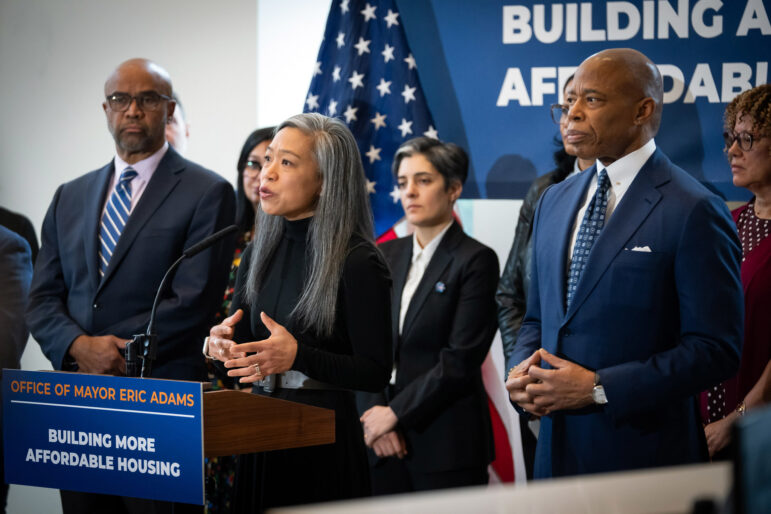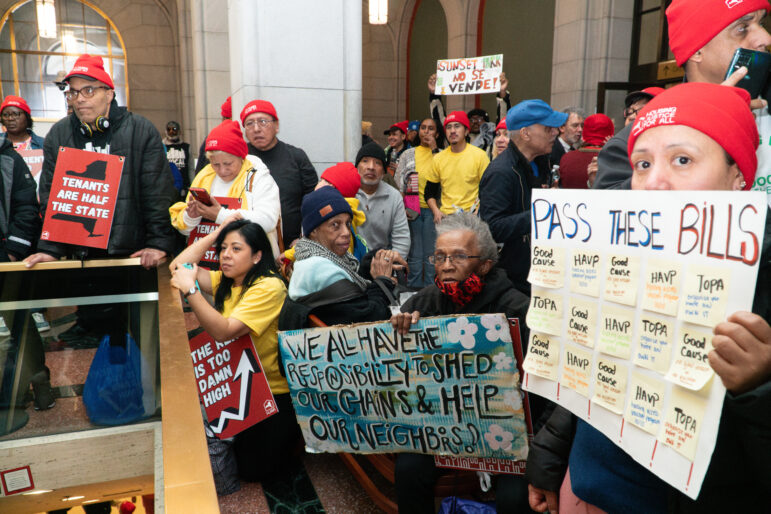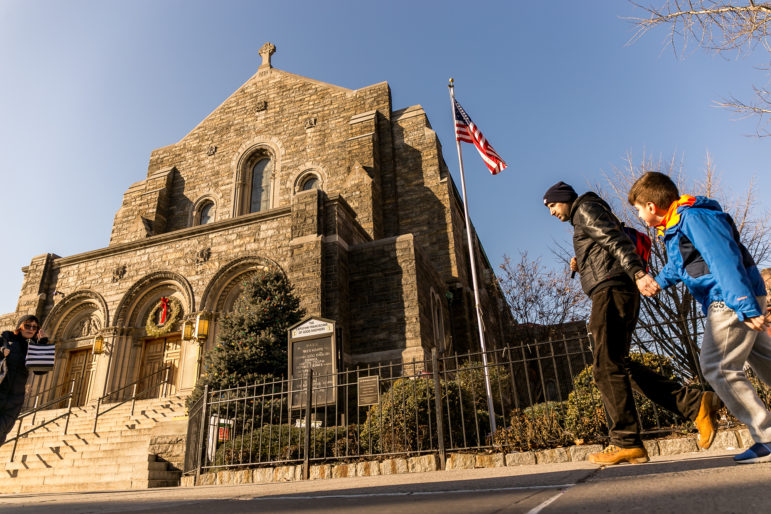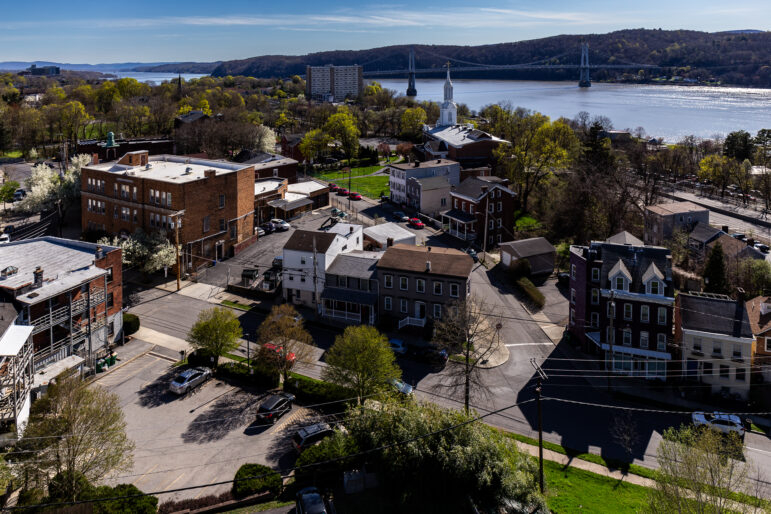New York City is responding to more reports of housing code violations that threaten the health and safety of New Yorkers, but not every repair is an easy fix. Violations are highly concentrated in a few Bronx and Brooklyn neighborhoods.
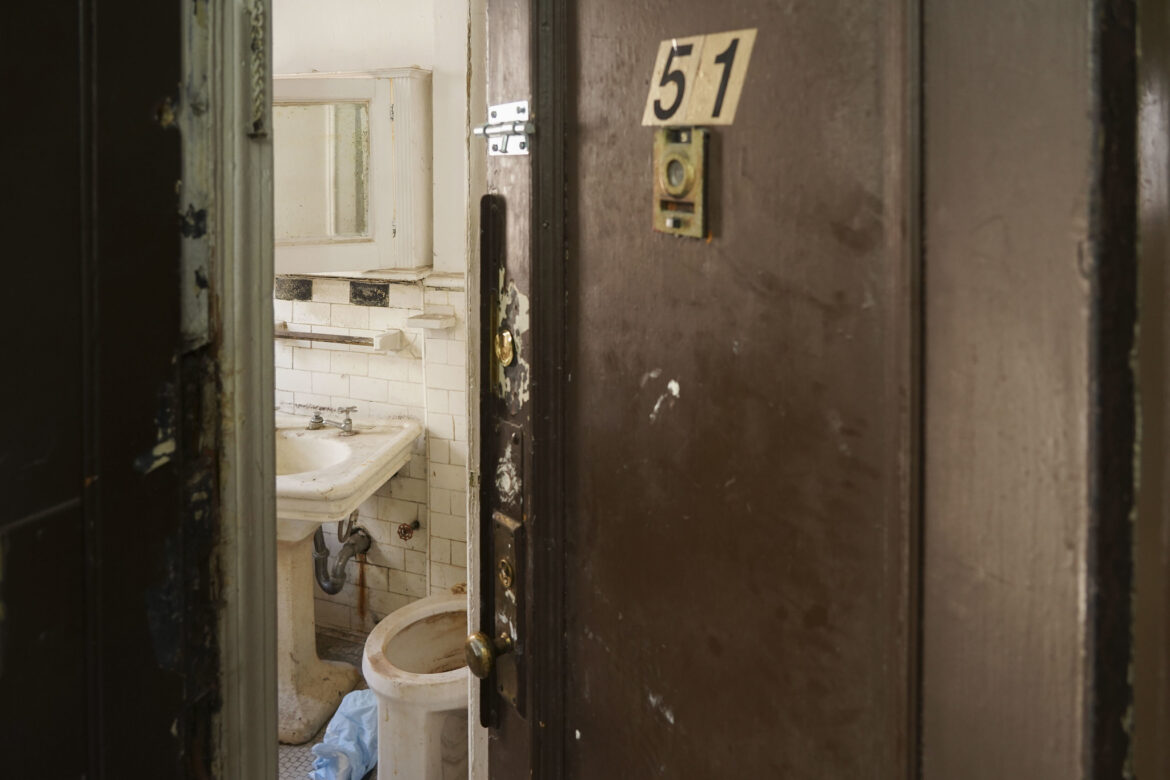
Gerardo Romo / NYC Council Media Unit
An apartment in a violation-riddled building in Washington Heights, where the landlord was jailed earlier this year for failing to make repairs.Housing code violations in New York City jumped 24 percent in fiscal year 2024 from the same period last year, according to the most recent data released in the Mayor’s Management Report.
With both reports and violations up, the city’s Department of Housing, Preservation and Development (HPD) is upping its capacity to respond, while tenants grow frustrated about how long repairs can take.
The increase is “due in large part to the increase in problems reported,” HPD said in the report. Between July 2022 and June 2023, the agency issued 722,597 violations, but that number increased by over 150,000 during the same period this past year, to 895,457.
HPD said the increase is also due in part to stepped up enforcement: the agency hired 100 inspectors in FY23 and FY24, but it hopes to still fill some remaining vacancies, according to a spokesperson. The biggest upticks were in violations related to self-closing doors and rain-related damage.
But tenants in buildings with longstanding violations say getting urgent repairs takes too long, and HPD doesn’t always have the ability to hold bad landlords accountable.
“It’s incredibly frustrating. There is a level of toxicity and gaslighting when it comes to [these violations],” said Lyric Thompson, who has been trying to get the front door of her building in Bushwick fixed since 2017.
Hot spots in the Bronx and Brooklyn
Harriet Harrigan first moved to the Northwest Bronx from the Virgin Islands in 1986. She says her building on Davidson Avenue, where she’s been since 2017, has fallen into such disrepair that HPD simply can’t keep up.
“[HPD staff] do come around regular[ly] and check to see what else needs to be done. I will give them that,” said Harrigan. “It’s just gonna take a while because there’s so much to be done.”
Harrigan’s building in the Northwest Bronx has had 396 violations in the past two years, three of which were open at the time of publication. The landlord, Romad Realty, owes the city tens of millions in unpaid property taxes (attempts to reach the company for comment Tuesday were unsuccessful).
“We’re definitely seeing increased physical distress across the Northwest Bronx and citywide,” said Jacob Udell, director of research and data at the University Neighborhood Housing Program (UNHP), a local housing nonprofit.
Hot spots for violations, like the Northwest Bronx, tend to have higher rates of poverty, more people of color, and older housing stock. Bronx Community District 4, which includes neighborhoods like Mount Eden, Highbridge and Concourse Village, had over 50,000 violations in the past fiscal year, including 18,000 still open. Just three Northwest Bronx community districts made up 14 percent of all violations issued citywide in the past year.
An HPD spokesperson said that aging housing stock requires more frequent maintenance and repair of deteriorating systems like roofing, facades, elevators, and boilers.
Landlords say that rent stabilized buildings like Thompson’s create a financial puzzle they can’t solve. Rents in regulated buildings aren’t high enough to support operating costs or repairs, said Kenny Burgos, director of the newly formed New York Apartment Association and a former Bronx assemblymember.
“Our members’ number one goal is to be fully compliant and provide nothing but quality housing, right? But they're restricted based on these reg[ulation]s that as I stated are just simply defunding the operations here,” he said in an interview with City Limits.
Landlords can also raise rents to help cover the costs of repairing stabilized buildings and apartments using the state’s Major Capital Improvements (MCI) or Individual Apartment Improvements (IAI) programs, which were modified by changes to New York State’s rent regulation laws in 2019.
While the legislature raised the cap for IAIs in the most recent budget deal, Burgos said the current threshold for both programs isn’t high enough to make the math work on repairs.
But Udell of UNHP said the picture is more complicated than just rent regulations, “including the remaining effects of the pandemic, inflation and rising operating costs (like insurance premiums), and a very different interest rate environment.”
“The housing that is in the most distress is precisely those properties owned by landlords who took the riskiest financial bets,” he added.
Shut the front door!
Most of the increase last fiscal year was among more serious violations. Both “hazardous” Class B and “immediately hazardous” Class C violations grew 32 percent, while Class A “non-hazardous” violations grew just 5 percent.
One reason, HPD says, is an emphasis on self-closing doors in public spaces in the wake of the disastrous Bronx Twin Park fire in 2022, when broken interior doors contributed to a blaze that killed 17 tenants. HPD issued 73,325 violations for self-closing doors in fiscal year 2024, up from 49,897 the year prior.
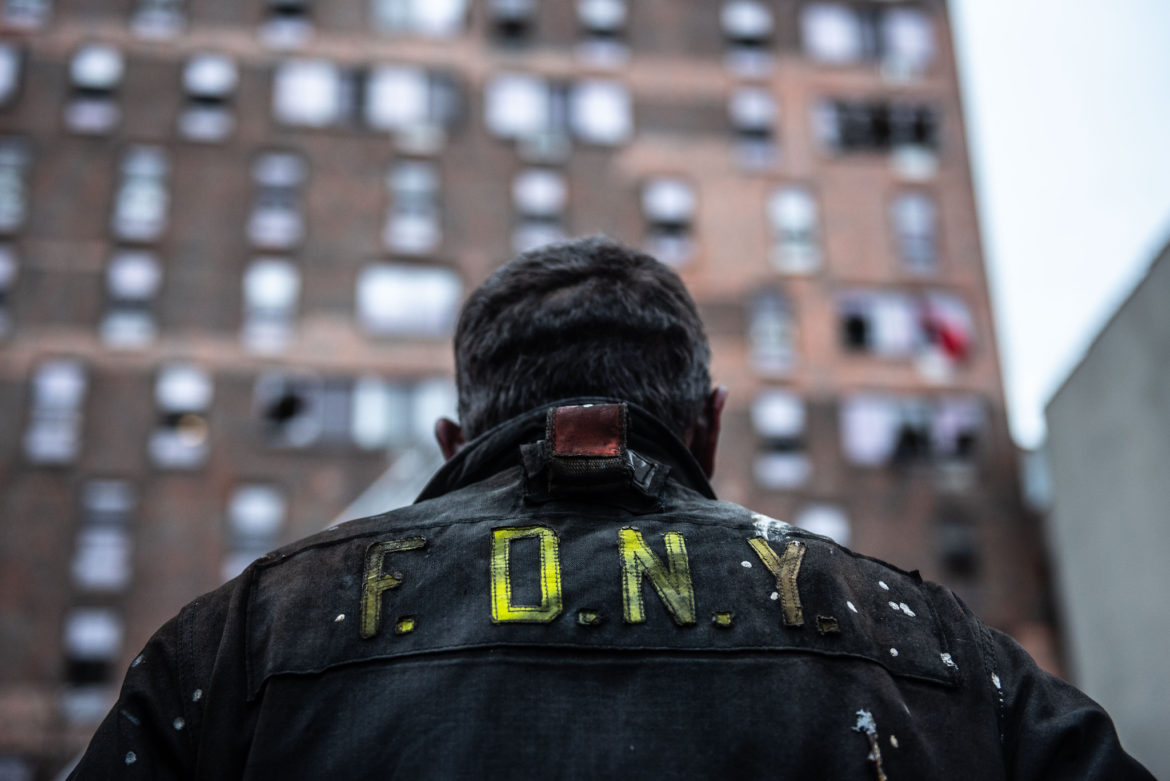
Michael Appleton/Mayoral Photography Office
The scene of a deadly apartment building fire at the Twin Parks complex in the Bronx on Sunday, Jan. 9, 2022. Officials said doors that failed to close contributed to the blaze.Since the fire, HPD intensified its focus on ensuring public areas and apartment doors are properly maintained, a spokesperson for the agency told City Limits. Ensuring doors close, latch, and lock creates a seal that prevents fires from spreading. It’s also important to building security and preventing unwanted entrants.
“It’s just practical safety,” said Hugh Chapin, president of the tenant association at 38 6th Ave. in Brooklyn. He says their building’s front door has not been locked for months, allowing random entrants to roam at will. “It’s not an amenity to have a front door that locks.”
Lyric Thompson has been going back and forth with her landlord, HPD, and the Department of Buildings about repairs to her building’s doors for years. She’s filed at least a dozen complaints with HPD since 2017 for the property on Decatur Street in Bushwick, but violations are often removed without an inspection, she said. So she called again and again.
Thompson says she won’t let slow progress deter her from continuing to lodge complaints. “It’s about enforcement for not just me but others. Because I don’t want another Twin Park.”
That Twin Parks fire, which was started by a faulty space heater, has also led to growing concerns over heat violations, which tend to affect the same neighborhoods as most housing code violations.
Starting Oct. 1, landlords are required to turn on the heat. Until May 31, apartments must be kept at 68 degrees fahrenheit or higher during the day and 62 at night. HPD issued 48 percent more heat violations than last year, up to 9,204 from 6,211—an increase it says is due to more housing inspectors and reduced response times.
Persistent hazards
Tenants sometimes feel they get the runaround. Thompson says her complaints only do so much when HPD is willing to take a landlord’s word that they made the repair, even if the job is incomplete. Instead of coming to fix it, “HPD would rather write another violation,” she said.
Owners are legally obligated to certify the corrections of violations within legally-defined timeframes. Tenants have the opportunity to challenge repairs, and if the violation wasn’t corrected, HPD can mark it as falsely certified.
During the period covered by the Mayor’s Management Report, 3,538 violations are currently flagged as falsely certified, according to HPD data.
In January, as required by Local Law 71 of 2023, HPD will be implementing a “certification watchlist” which will show properties with a recent history of false certifications, according to a spokesperson. Certifications from buildings on that list will require inspection and may face civil penalties if deemed false.
When issues persist, HPD staff can do emergency repairs themselves and charge the landlord. According to the report, HPD initiated the emergency repair process for 61 percent of Class C violations last fiscal year. Just under half, 49 percent, were eventually corrected by the owner, and 7 percent were fixed by HPD.
In fiscal year 2023, 41 percent of violations were filed and resolved within the same year, according to HPD data, on par with prior years despite the increased volume.
In some cases, HPD will sue, like it did to get the boiler fixed at 38 6th Ave. On Davidson Avenue, where Harriet Harrigan lives, tenants are calling for the city to foreclose the property and transfer the building’s ownership to more responsive landlords using the city’s Third Party Transfer Program, now defunct but recently seeing momentum to be revived with additional protections for low-income tenants.
But not all repairs are in struggling older buildings. 38 6th Ave. is just seven years old. There, tenants say they have asked for repairs to their front door, boiler, and intercom, but their landlord has failed to set aside money to fix it, giving tenants and HPD the runaround, according to tenant association president Chapin.
“Their strategy is to be Lucy with the football until they put it in the budget,” said Chapin.
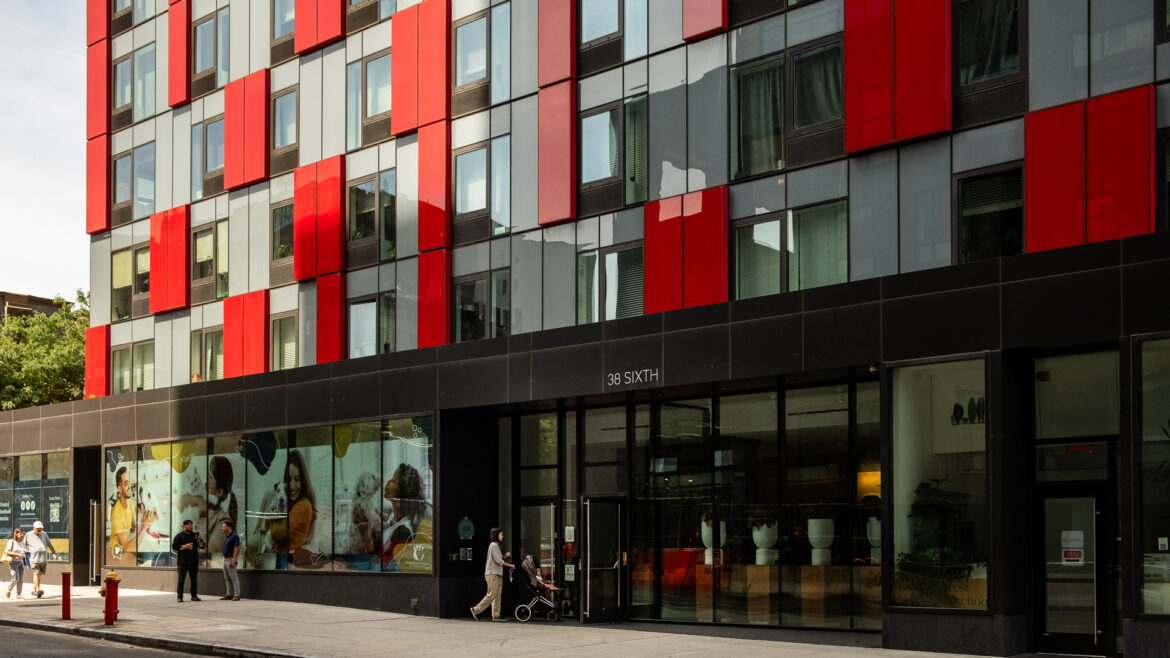
Adi Talwar
38 Sixth Ave. opened in 2017, part of the Atlantic Yards (aka Pacific Park) project in Brooklyn.Now, tenants are suing the property manager, Avanath, over the broken doors, intercom, and roach infestations. That lawsuit, which will be heard in court later this month, comes after Adam Butler, the owner, settled a lawsuit from HPD on Sept. 25 for failures to provide working hot water.
A representative for Avanath said additional security was deployed in the building’s lobby during periods when the front door was being repaired. Fixes to the intercom system are now in the “final stages of completion,” while the boiler “has been operating without any issues since repairs were completed two months ago.”
“At Avanath, we recognize that regular maintenance is part of the normal lifecycle of any residential building, especially in a property of this size. As issues naturally arise, whether routine or unexpected, our goal is to address them quickly and effectively,” Carly Stevenson, the company’s executive vice president of property management, said in a statement to City Limits.
In some buildings, small problems that don’t get resolved can lead to bigger problems down the road. “When Romad Realty was in control… they never really did the work. So that little patch would lead to these major problems that now HPD is trying to resolve little by little,” said Harrigan.
Landlord groups, again, say financing is to blame for deferred maintenance or stopgap fixes. “That's gonna lead to a poor experience for the tenant and just this adverse relationship between, you know, property owners and HPD and tenants. And that's not what we want. We want to provide adequate housing,” said Burgos.
A spokesperson for HPD pointed to the J-51 tax abatement program, which expired in 2022, as a crucial tool for rehabilitation and repairs in older rent-regulated buildings that doesn’t pass the burden onto tenants through increased rent. The agency is working with the City Council to bring back the program, the spokesperson added.
UNHP’s Udell said the city needs more subsidy programs targeted to the most deeply affordable and in-need properties—something like the Multifamily Water Assistance Program, a subsidy to help offset water costs for low income housing units.
In the meantime, some tenants are left frustrated and stuck in decrepit buildings. For Harrigan, the goal is to be able to stay in the community she calls home.
“I really like the neighborhood,” she said. “It's not a bad neighborhood. But this is New York… anything can happen anywhere, anytime.”
To reach the editor, contact Jeanmarie@citylimits.org
Want to republish this story? Find City Limits’ reprint policy here.


